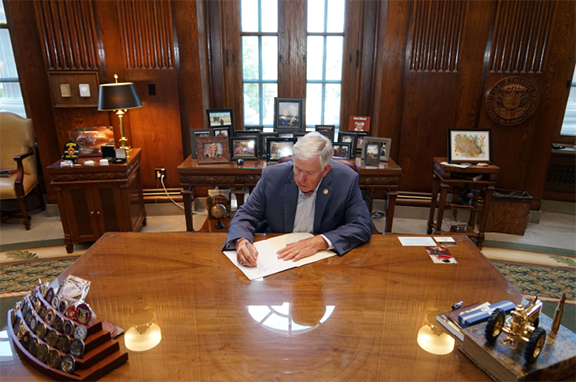By Dale Wright, state representative
JEFFERSON CITY – Governor Mike Parson has signed the Fiscal Year 2025 (FY25) state operating/capital improvement budget bills, investing in workforce development and infrastructure while also maintaining the state’s AAA credit rating, achieving the lowest unemployment rate in Missouri history, adding 163,000 jobs to our economy, and cutting citizen’s income tax burdens by over 20 percent. We’ve done it all while leaving $1.9 billion on the bottom line.

The FY25 budget bills include billions of dollars for key infrastructure projects:
$1.5 billion for broadband investments in rural and underserved areas of the state.
$577.5 million to pave the way for I-44 expansion from St. Louis to Joplin.
$290 million for road and bridge projects within the Statewide Transportation Improvement Program. $27 million to help upgrade Missouri’s airports across the state.
$60 million to add north & southbound lanes to Hwy 67 from Poplar Bluff to the Arkansas state line.
Public service is about putting people first which requires Missourians receiving the necessary education and skills to meet the demands of the future so they can achieve their American Dream.
The FY25 budget prioritizes investments in both education and workforce development:
$367.7 million to continue higher education capital improvement projects.
$361.4 million to fully fund school transportation needs for the third year in a row.
$121 million to again fully fund the K-12 Foundation Formula for the sixth year in a row.
$69.3 million for the Career Ladder reward program.
$54.4 million for the fifth year of MoExcels projects and employer workforce training investments.
$33.4 million for the Teacher Baseline Salary Grant Program which increases baseline K12 educator pay to $40,000 per year (participating schools no longer have a grant match requirement).
$32.5 million core funding increase for state higher education institutions.
$10 million to invest in semiconductor production research, development, and skills training.
$4.2 million for Jobs for America’s Graduates (JAG-Missouri).
$3.1 million for Missouri Youth Apprenticeships.
Increased child care subsidies and funding for Pre-Kindergarten for all eligible 4-yearolds:
$56 million for public and charter schools to provide Pre-Kindergarten programs to all students qualifying for free and reduced lunch.
$54.8 million to increase rates for child care providers.
o Raising rates to the 100th percentile for infants and toddlers and to the 65th percentile for preschoolers and school-aged children.
$26 million for private child care providers to offer Pre-Kindergarten programs to students qualifying for free and reduced lunch.
This year’s budget continues support for Missouri’s number one economic driver, agriculture, and improves the infrastructure necessary for farmers, ranchers, and rural Missourians to get their goods and services to market:
$100 million for Missouri’s low-volume and lettered roads in rural areas.
$11.6 million for improvements at Missouri’s river ports.
$5 million for Missouri River Flood Resiliency efforts.
$3.5 million for the Agriculture Resiliency Fund.
$182,000 for the enforcement of Executive Order 24-01, foreign ownership of land.
The FY25 budget invests in state employees and upgrades in the services for Missourians:
$134 million to maintain, repair, and renovate state facilities.
$111 million to provide a 3.2 percent salary increase for all state employees.
o Including a one percent salary increase for every two years of service (capped at 10 percent) for certain DMH, MVC, DSS, DOC, DESE, OA, and Judiciary employees.
$19.4 million for statewide technology upgrades.
$8 million for addressing behavioral health care and other health care staffing shortages.
$7.2 million for Maternal Mortality Prevention.
The FY25 state operating budget is $50.5 billion, including $14.9 billion in general revenue.
As of July 1, 2024, Missouri expects to have a nearly $6 billion fund balance. However, fund balance does not equal surplus. More than 66 percent of Missouri’s fund balance has already been obligated for FY25 – meaning state government has approved spending plans that must be paid throughout the coming fiscal year.
